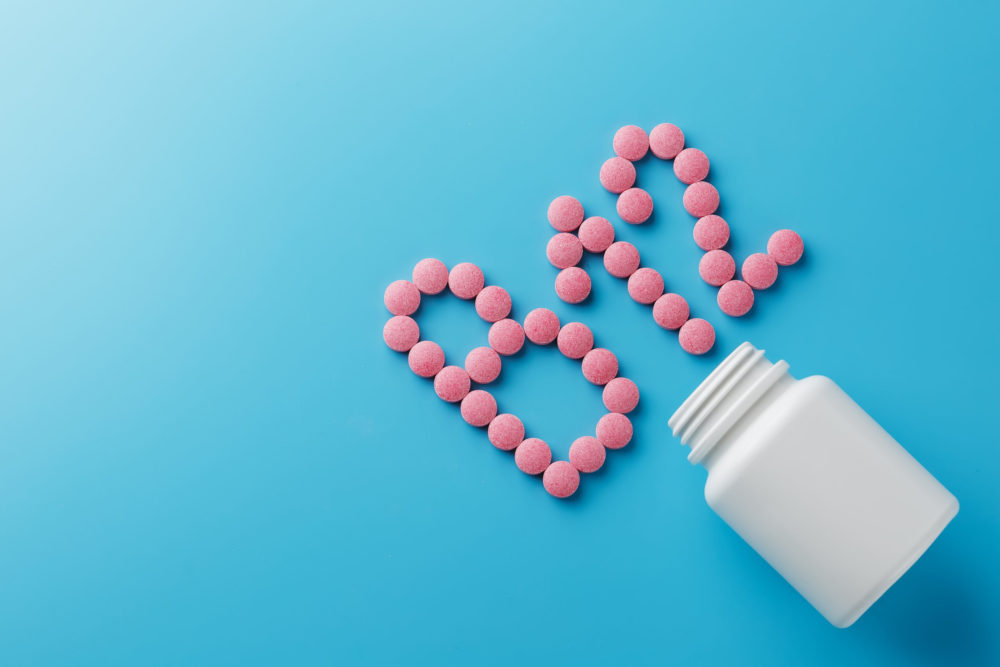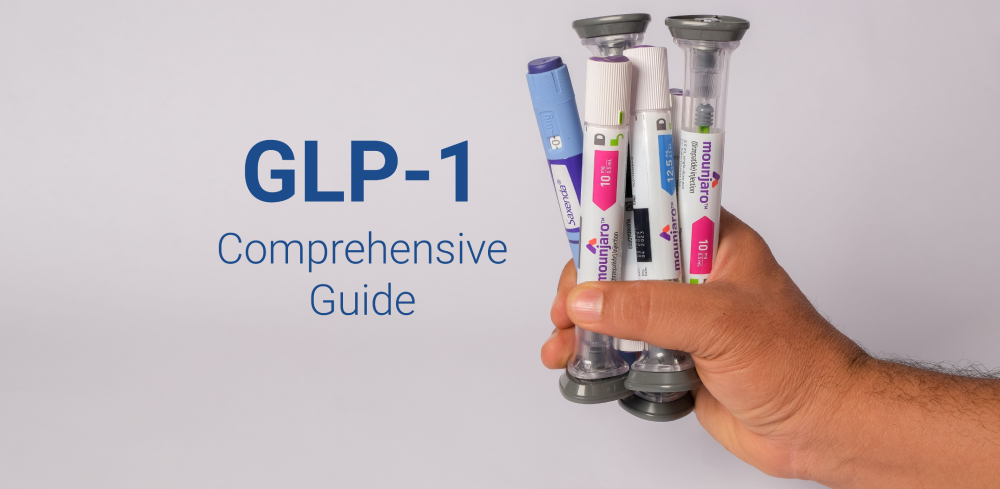
Vitamin B12 – A Comprehensive Guide
Introduction
Vitamin B12 plays a vital role in many of your body’s functions, but unlike the better-known vitamins A, C, and D, B12 is often overlooked. With a growing number of people opting for vegetarian and vegan diets, vitamin B12 deficiency in the US and the UK has increased to about 6 percent of those under the age of 60, and 20 percent of those over the age of 60, so let’s get to know our B12 up close and personal. In this article, we’ll explore what vitamin B12 is, why we need it, what the health benefits of taking a B12 supplement are, who is susceptible to a B12 deficiency, why B12 injections might work for you, and whether they can in fact help you lose weight. Read on to find out more!
What is vitamin b12?
B12 is one of the many nutrients our bodies need to function correctly. This is a need, not a want. This is because it keeps blood and nerve cells working, and is fundamental in the process of making DNA. It also prevents megaloblastic anemia, a debilitating disease responsible for feelings of intense fatigue. Vitamin B12 is found attached to proteins in the food we eat. Once that food reaches the stomach, stomach acid breaks down that bond so that the B12 can then attach itself to a more absorbable water-soluble protein to be utilized by the body. Unfortunately, some people are missing this special stomach protein called ‘intrinsic factor’ and therefore cannot properly absorb B12 in the conventional way, via food.
Why Do We Need Vitamin B12?
We need vitamin B12 for many reasons. For starters, it aids in the prevention of health ailments such as faintness, headaches, heart palpitations, mouth ulcers, difficulty keeping balance, vision changes, pins and needles, sore swollen tongue, memory loss, confusion, megaloblastic anemia, diarrhea, constipation, anxiety, shortness of breath, dementia, depression, and nerve issues such as a numb sensation in the hands or feet.
Additionally, B12 works in conjunction with other vitamins to make red blood cells. Without it, iron and oxygen cannot effectively get around our bodies. This would manifest in shortness of breath and chronic tiredness. We also need it to have a healthy working nervous system, the system responsible for all our mental activity.
B12 is also essential in order to gain fuel for our bodies from the foods we eat and it improves our mood. Without vitamin B12, serotonin (known as ‘the happy hormone’) synthesis and metabolism is decreased.
B12 reduces the loss of neurons in the brain. Without it, memory declines as neurons decrease with age.
B12 keeps our bones healthy. Conditions like osteoporosis are linked to B12 deficiency, as B12 is needed to develop healthy bones and to keep the bone mineral density level high.
Women who are pregnant need to be particularly vigilant to avoid any deficiency in B12 as babies who are born with a deficiency in vitamin B12 levels are susceptible to experience severe neurological issues.
More serious complications of a B12 deficiency include heart disease, infertility, coordination problems, neurocognitive disorders, peripheral neuropathy and vision loss.
Who is Susceptible to a B12 Deficiency?
An adult needs, on average, about 2.4mg of B12 per day. To give you an idea of how much that is,
there is 0.6mg in one egg, so you would need to eat at least 4 eggs per day to cover your needs, assuming it is all absorbed perfectly into your system.
Many people are susceptible to vitamin B12 deficiency, amongst them are:
-
Vegans and vegetarians are often deficient, due to their special diets not including many B12 rich foods such as cereal (fortified), eggs, chicken, milk, cheese, shrimp, oysters, clams, mussels, sardines, trout, and salmon.
-
Elderly people are susceptible as well as absorption of B12 is less and less effective the older you get.
-
Anyone who has problems with their gut function, including those who suffer from irritable bowel syndrome, Chron’s disease and Celiac disease.
-
People who have undergone some sort of trauma to the intestines including a gastric bypass or intestinal surgery can be susceptible to vitamin B12 deficiencies since they may have less cells present to produce the protein to which the B12 can attach, resulting in a decreased ability to absorb B12 into the bloodstream.
-
Anyone who produces a lower-than-normal amount of stomach acid, resulting in a certain kind of bacteria growing in the stomach and using up all your B12.
-
Smokers or those who drink alcohol
-
Diabetics
-
Anyone with a thyroid disorder or an endocrine-related autoimmune disorder.
Vitamin B12 and Weight Loss
Many foods rich in vitamin B12, such as seafood, beef, eggs, and dairy products are often avoided by people trying to lose weight. If your diet includes no or little amounts of these foods, make sure you get your B12 from alternative sources since a B12 deficiency could actually work against you in your effort to lose weight. A person experiencing a deficiency in B12 becomes tired, lethargic, and can experience problems with balance and coordination, which prevent you from adding exercise to your weight loss routine. Some may also experience constipation, leading to an inability to absorb nutrients, or a sluggish metabolism. All these can make it difficult to lose weight and keep a healthy lifestyle.
Mitigating the deficiency will result in an increase in energy levels and a boost for the metabolism, while improving your mood, all of which have been proven to help with weight loss.
Frequency
Vitamin B12 Injections for Weight Loss
Whether you are looking to cut calories or have a busy lifestyle, adding foods that are rich in vitamin B12 to your diet is not always possible. B12 injections are a super-fast and easy alternative to getting the vitamin you need, directly into your bloodstream. And because a shot is the most effective way to administer a large quantity of B12, you can be on your way to having the energy you need to exercise and the optimal metabolism levels, soon after the shot is administered.
As opposed to many of the B12 tablet supplements on the market which are derived from animal products, our vitamin B12 injections are made with naturally-sourced hydroxycobalamin and methylcobalamin, making them a suitable alternative for vegans and vegetarians who might feel uncomfortable with animal-based vitamins. Additionally, these formulations are effectively absorbed by the body.
Many people with stomach or gut issues that prevent their bodies from absorbing B12 from food or from a tablet, a B12 injection may be the only way to correct the deficiency.
How Often Should I Get B12 Injections?
B12 is water soluble, making it a very safe supplement with no maximum amounts recommended, since any excess B12 will be eliminated by your body.
Generally speaking, however, for a deficiency, the injection should be administered once every 1 to 3 months, depending on the severity. This will prevent any symptoms from returning. As part of a weight loss plan, we recommend you receive a B12 shot once every 2 weeks to achieve a great energy boost and accelerate your metabolism. If you’ve had gastric bypass, gastric sleeve, take a diabetes medication such as metformin, or an acid-reflux medicine for GERD, a shot once a week is recommended.
Our team of health professionals will administer the injections in our clinic.
Are there Risks Involved?
There are no major side effects associated with taking large quantities of B12, in fact for this reason
there is no limit to the amount you can take. The most common mild reactions to injections are redness or itchiness at the injection site or mild diarrhea. As with any other supplement, there is a possibility of an allergic reaction or interactions with other drugs you may be taking. Prior to beginning a B12 regimen, discuss with a certified medical professional.
How Fast Will I See Results?
If you have a significant deficiency in vitamin B12 and have had it over a long period of time, your results will be fast and dramatic, particularly as it relates to an increase in your energy levels and a reduction of numbness, tingling and other symptoms.
A vitamin B12 deficiency can not only diminish your ability to lose weight, but it can lead to many serious health issues, some of which are irreversible, so if you are having or have had problems with your gut, are older in age, or follow a specialized or restrictive weight loss diet, don’t hesitate to get tested.

Lose Weight. Feel Great.
Rivas Medical Weight Loss is here to guide you
with expert care and top quality medication.
Book Appointment





